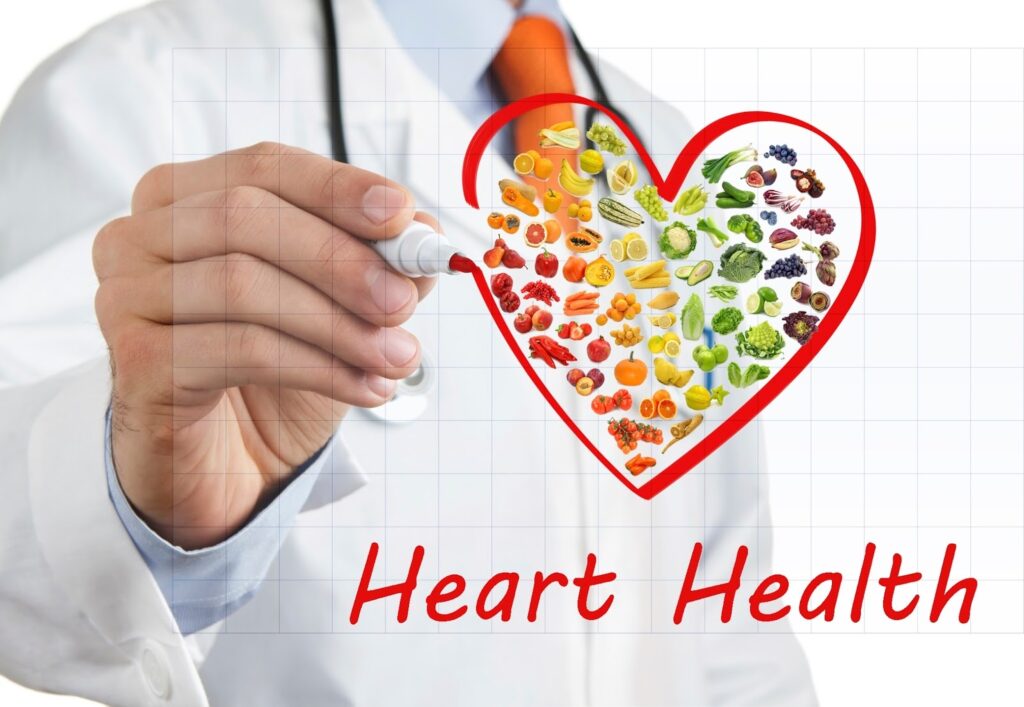This article intends to impart a summary of the outcomes in a recent systematic review – (i) the diet that is associated with a lower risk of cardiovascular disease (CVD), including stroke and heart attack, (ii) precisely what you can undertake to attain a heart-healthy diet, and (iii) how efficacious each component of the diet is in lowering your risk of CVD.
What is remarkable is that a heart-healthy diet as delineated below not only is correlated with a reduced incidence of heart attacks and strokes, but such a diet is also associated with a lower risk of dementia. Multiple research studies have discovered that foods that are beneficial for your heart vessels also seem to be advantageous for your brain.

When it comes to dietary guidance for heart health, it usually involves reducing the intake of saturated and trans fats, increasing the consumption of fruits, vegetables, whole grains, and lean proteins. Limiting salt and sugar intake is also crucial. Such a diet can help lower cholesterol levels, control blood pressure, and maintain a healthy weight, all of which are essential for a healthy heart.
Do you follow a heart-healthy diet?
The serving size of each food depends on the specific item. It has been noticed that each additional intake of 30g per day of whole-grain foods leads to an 8% reduction in cardiac death. The data on stroke and stroke-related death is similar. Just to add, steel cut oats or rolled oats are preferred over instant oats as the latter has a higher GI.
Take 1 serving a day of nuts and seeds per day (equivalent to one handful, around 30g)
Example: Almonds, walnuts, hazelnuts, pumpkin and sunflower seeds)
The daily consumption of 28g of nuts is associated with an average 25% reduction in the incidence of heart artery disease.
Take 1 serving a day of extra virgin olive oil or non-tropical vegetable oils
Example: Soybean, sunflower, safflower, and corn oil, instead of butter and other animal fats or tropical oils rich in saturated fat (i.e. coconut oil, palm oil)
An individual’s daily oil intake can range from 20g to 45g depending on energy requirements. Choosing olive oil rather than oils rich in saturated fats is associated with a reduction of heart disease by 7%, and death from stroke and heart disease by 8% (for every 5g increase in olive oil intake). Taking vegetable oils rich in linoleic acid (i.e. safflower, sunflower, corn, and soybean oils), instead of oils high in saturated fats results in a similar pattern of risk reduction. But remember, do not overdo the olive oil or canola oil because they still contain some saturated fats which raise bad cholesterol – you can use these oils for cooking but minimize their use where possible, especially if you already have risk factors like high cholesterol.
Take 1 serving a day of yoghurt (unflavoured)
A protective effect has been reported for a daily amount of yogurt of at least 200g per day with nearly 8% reduction in strokes and heart attacks.
Take 4 servings a week of legumes(180g per serving)
Example: Dry, fresh or frozen beans, long beans, red kidney beans, black beans, green (mung) beans, chickpeas, peas, fermented soy foods like natto and miso
Up to four servings of 180g (fresh or frozen) legumes per week has been associated with a reduction in heart disease by 14%.
Take up to 4 servings a week of fish (equivalent to 150g)
Example: Fresh or frozen sardines, mackerel, cod, salmon, shellfish, tuna
A meta-analysis reported a 12% reduction in the incidence of heart disease for 4 servings of fish weekly (100g per serving); other meta-analysis indicate that even smaller fish intakes (100–150g per week) are associated with a lower benefit of about 4% to 7% reduction in heart disease. The benefit on reducing heart disease is less evident for consuming more than 3 to 4 servings per week.
Which dietary habits will have an impact on heart health?
Some dietary habits that have an impact on heart health include eating too much processed foods, which often contain high levels of salt, sugar, and unhealthy fats. Consuming excessive red meat and full-fat dairy products can also be detrimental. On the other hand, not getting enough fruits, vegetables, and whole grains in your diet can increase the risk of heart problems. Drinking too many sugary beverages and having a high intake of alcohol can also negatively affect heart health.
analyses reveal a 10% reduction in heart disease and stroke deaths associated with every 3 servings less per week of unprocessed red meat consumed (that is, a person who takes 1 serving per week would have a 10% lower stroke/heart attack death rate than another individual who takes 4 servings a week). Where the consumption of unprocessed red meat was 100mg per week, there was no significant increase in risk compared to those who took less than this amount2.
No more than 2 servings per week of Butter (each serving equivalent to one tablespoon)
A daily serving of 50g per day of processed meat is associated with a 27% to 44% increase in the incidence of stroke/heart disease.

Alcoholic drinks
In the context of a healthy lifestyle, with no other contraindications such as liver disease, there is evidence that low-to-moderate alcohol consumption is associated with a reduced cardiovascular risk.
Up to 24g per day of alcohol (about two glasses of wine) was associated with risk reduction while higher intakes were associated with an increased risk. Moderate beer consumption (one can per day) was associated with a 20% lower risk of stroke/heart disease as compared with abstainers. Notably, data on all-cause death suggest a smaller intake of alcohol (10g per day) to obtain the maximal risk decrease.
So, do you often pay attention to health-related articles?
This article is for reference purposes only. If you have any health issues, please head to the hospital promptly and follow the doctor’s recommendations.
